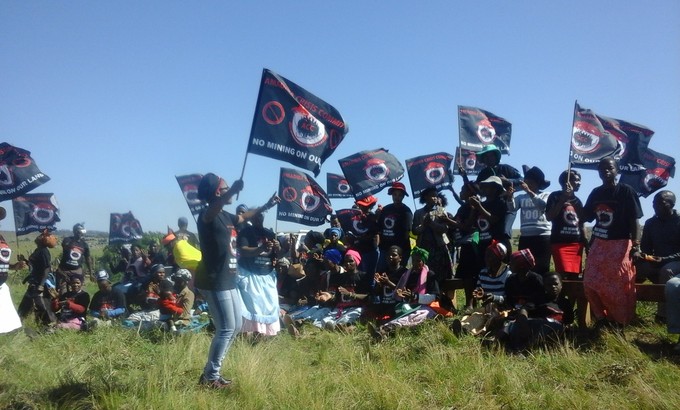Rural South Africa is on a Precipice
Countryside sliding into ever more violent confrontations
The murder of Sikhosiphi “Bazooka” Rhadebe, a leading opponent of titanium mining in Xolobeni in the Eastern Cape, marks a crisis that has been building for over two decades around land and chiefs in rural black South Africa.
Rhadebe, chairman of the Amadiba Crisis Committee, was killed on 22 March 2016. The context of his murder is a scramble for self-enrichment by chiefs which is not confined to the Wild Coast.
A raft of laws since the advent of democracy has progressively given power over land and people to traditional leaders. An delay of almost 10 years after the first democratic elections of 1994 in defining the roles and powers of chiefs created a vacuum into which some ambitious chiefs drove their agenda of being local despotic sovereigns like many were in Bantustans.
The laws that have been passed, starting with the Traditional Leadership and Governance Framework Act of 2003, have failed to create sufficient mechanisms for rural citizens to hold their chiefs to account. With the discovery of minerals on land that was considered of little value under apartheid and to which black South Africans were consigned by laws such as the Group Areas Act, things have gone from bad to worse for ordinary citizens.
Many chiefs are scrambling to push themselves to the forefront of empowerment companies for self-enrichment from mining deals. This is the case in Xolobeni. It is the case in the North West province, where Premier Supra Mahumapelo has dodged the dismissal of Chief Nyalala Pilane of the BaKgatla following years of autocratic rule and refusal to account for mining revenue that should have been used to benefit communities in the Pilanesberg area. It is the case in KwaZulu-Natal where in Mtubatuba and Melmoth people are being intimidated for objecting to the destruction of their land and the contamination of their drinking water.
The countryside is sliding into ever more violent confrontations between people and their supposed customary leaders. The government just keeps making things worse. This has become obvious with regard to landholding and decision-making about communal land in recent years.
Land restitution for people who had been dispossessed of their land under apartheid began with the opening of the land claims process in 1994. The window to submit claims closed 1998. The Communal Property Association Act of 1996 created a mechanism for people who successfully submitted restitution claims to hold their restitution land communally and make decisions collectively.
Chiefs expressed vociferous objections to this arrangement and some simply allocated restitution land belonging to CPAs to others, claiming that the land was historically theirs. The consequences for some CPAs have been devastating. In Ekuthuleni near Melmoth, the houses of members of the CPA were burned by the chief’s supporters in September 2014.
Land claims were reopened with the Restitution of Land Rights Amendment Act in 2014. The government’s proposed solution to the tensions between chiefs and CPAs, contained in the draft Communal Land Tenure Policy of 2014, is that land in black rural areas should vest in traditional councils and not CPAs. What is alarming is that these traditional councils are undemocratic institutions in which women generally have insignificant representation.
According to the Traditional Leadership and Governance Framework Act of 2003, the old apartheid tribal authorities were meant to be reformed, with 40% of members elected and 60% selected by the royal family. In addition, 30% of council members were supposed to be women. Across the country the mechanism has been a desperate failure, with hardly any council meeting the composition requirement. Yet government sees these dysfunctional councils as the solution.
What is clear is that in the first 10 years of democratic rule, little was done to clarify the roles, functions and power of traditional leaders and to integrate the former bantustans into the constitutional order. By the time the Framework Act appeared in 2003, the horse had bolted. Chiefs focused on advancing their own interests in mining deals and so occupied the vacuum in ways that would shape rural politics to their advantage. They clamoured for the state to recognise their vision of rural governance as a return to African ways that had been destroyed by colonialism and apartheid.
The state has capitulated. Ruling elites in rural areas have captured the state in their own ways, often working in tandem with capital and representatives of political parties at local, regional and national levels. The consequences are devastating for ordinary citizens: crumbling houses due to mining on their doorsteps to which they have never consented, revenue that should be going into community development funding lavish lifestyles for a few, and much more. Those who call for accountability pay the price.
Bazooka Rhadebe is dead. As things are unfolding, it seems there’ll be many more Bazookas before there is change. Too much money is at stake for a few and those who get in the way will be removed. It didn’t have to come to this. Things could have been done differently a long time ago. Things must be done differently now before rural South Africa goes up in flames.
Bazooka’s death must not be in vain.
Views expressed are not necessarily GroundUp’s.
Support independent journalism
Donate using Payfast

Don't miss out on the latest news
We respect your privacy, and promise we won't spam you.
© 2016 GroundUp. 
This article is licensed under a Creative Commons Attribution-NoDerivatives 4.0 International License.
You may republish this article, so long as you credit the authors and GroundUp, and do not change the text. Please include a link back to the original article.

